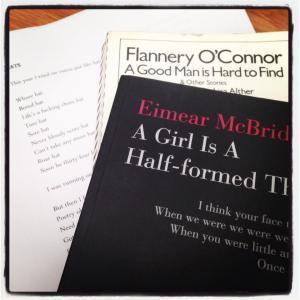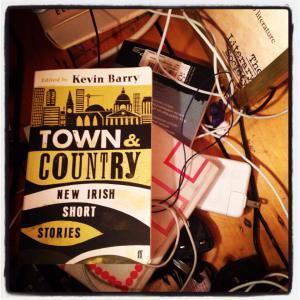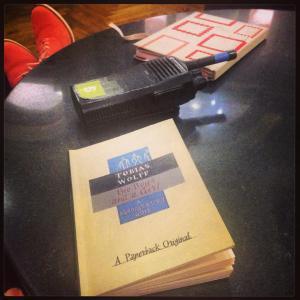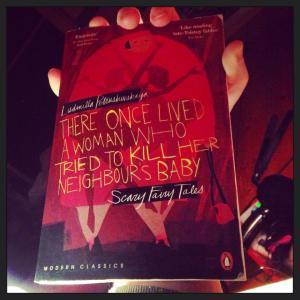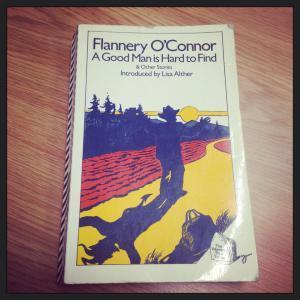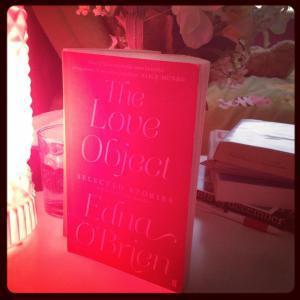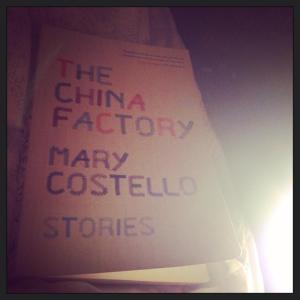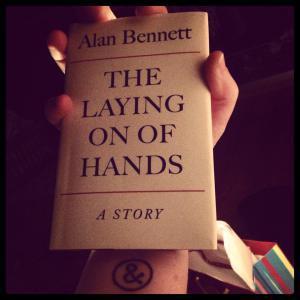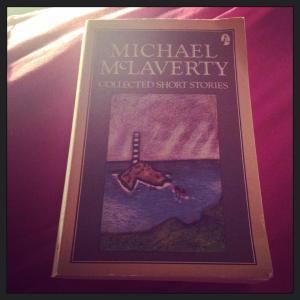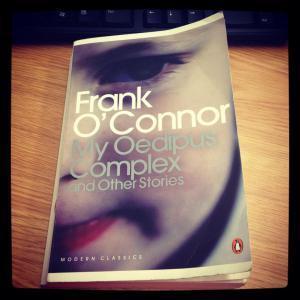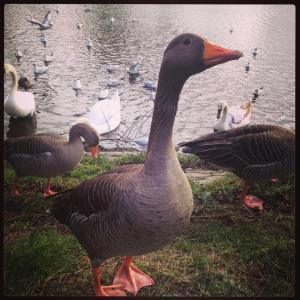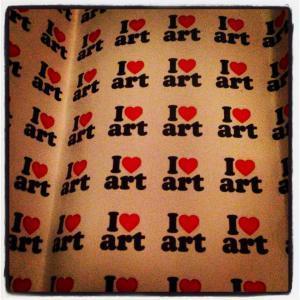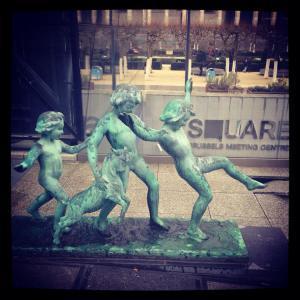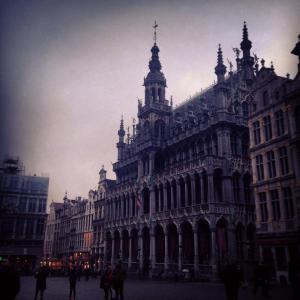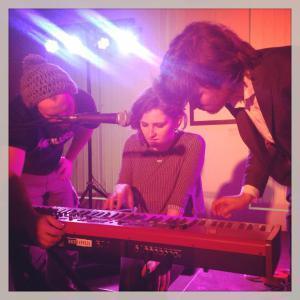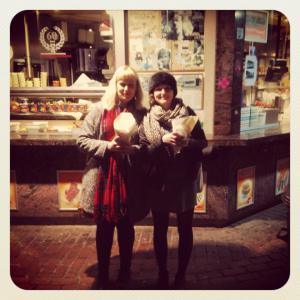Jan Carson's Blog, page 21
March 20, 2015
Postcard Project 2015 : Week Eleven
March 12th 2015 ��� Ulster Hall, Belfast
Iain Griffin
There are two perfectly round blisters on the palm of my right hand. They are five days old now and beginning to peel away from themselves like the onion paper which drops from a just bloomed flower. The blisters interrupt the upward and downward strokes of the creased M which has always been etched into my right, but not my left, hand. They are still raw almost a week after the incident and occasionally bleed. I have always believed that this purpled M striding across my palm from thumb to pinkie, represents marriage. Now, I can no longer recall where this belief came from and the blisters catch on everything I touch.
March 13th 2015 ��� Dundonald Ice Bowl, Belfast
Will Trimble
Urban legends associated with Dundonald Ice Bowl:
Enormous carnivorous rats are breeding undetected beneath the primary-coloured surface of the Indiana Land ball pool. (Untrue).
A young girl from Ballybeen was once scalped after her ponytail became inadvertently tangled around the ball feed serving the thirteenth and fourteenth lanes of the ten pin bowling alley. She later died. (Untrue).
At least half a dozen amateur ice skaters have had their fingers severed by skating strangers incapable of bringing their blades to a timely halt, (Untrue).
During the winter of 2003 a zealous young youth worker verbally coerced two teenage boys from another youth group on to a coach parked outside the Ice Bowl. She thought they were two of hers. They were all wearing tracksuits. She only discovered her mistake some twenty five minutes later in Newtownards. The teenagers belonged in Coleraine. (Impossible to verify).
March 14th 2015 ��� Cathedral Quarter, Belfast
Katie Richardson
James insisted upon writing his novel on an ancient typewriter. It was blue, duck egg blue, and came with its own case. He carted it round town like a first aid kit.
���I can���t stomach computers,��� he said. ���They make me feel so very removed from the words, as if they don���t exist anywhere properly. Sentences are so much easier to believe in on paper, don���t you think?���
She agreed in principle, and agreed again as they entered the coffee shop and could not concentrate on her crossword when he began clunk, clunk, clicking at the typewriter keys and everyone in the room turned to stare.
���What about using a pen?��� she suggested. But pens were not ostentatious enough for James.
March 15th 2015 ��� St Georges Church of Ireland, Belfast
Lisa Keogh
During the sixteenth century it became common practice for people to return to their mother churches on the fourth Sunday of Lent. Later, this tradition was extended to include servants of all types. For one Sunday per year these hard-working individuals were given grace to be with their own families and hometown congregations. This day became known as Mothering Sunday. Journeying from new home to old, children and young people ���in service��� would pick wild flowers as gifts for their waiting mothers. The idea of greetings cards had not occurred to them yet, neither had Marks and Spencers���.
March 16th 2015 ��� Queen���s Film Theatre, Belfast
Paul Kane
We were not a dog family. We kept chickens for the eggs and, from time to time, a goldfish or two in a cheap, plastic bowl. Neither were we close to any families who did dogs. Consequently all my assumptions about dogs have been drawn from Disney movies and Enid Blyton and those individual dogs ���mostly Jack Russells- I���ve encountered, anchored to the Belfast Telegraph sign outside the VG. Therefore, when the yellow dog approached me in the park, its gums exposed, pink as cooked ham slices, also its teeth, I assumed this dog���s mouth to be smiling in a peculiarly doggish fashion and extended a friendly hand, which I still miss and, in missing, regret the fact that we were not a dog family.
March 17th 2015 ��� Ulster Hall, Belfast
Geoff Doyle
St Patrick, returning to Ireland centuries after his last great departure, was horrified to find himself, and not holy God, the centre of attention. The statues he could stomach, even the fool tales of Satan defeated from Slemish mountain and snakes driven belly first back into the sea. But the 17th of March was an ongoing mystery to him. What, Patrick wondered, did Leprechaun hats and endless pints of gloss, black Guinness and bloody green everything, have to do with the sanctification of Ireland? Left to their own devices all the sinful snakes had slithered home, sunk their teeth into Irish soil and held on.
March 18th 2015 ��� East Belfast
Todd, Joe and Gillian McEvoy
It is a little known fact, rarely alluded to, that the postboxes of East Belfast are connected one to the other by an elaborate network of underground tunnels and chutes. The postmen of East Belfast, despite their hats and luminous jackets, are not real postmen but rather volunteers, employed by the Postal Service, to go from one postbox to another shouting encouraging sentiments through their open-mouthed slots.
���Godspeed you brave envelopes.���
���Keep trucking little postcards.���
���Be not so fear ye bills and payment slips.���
Thus encouraged the post of East Belfast speeds backwards and forwards beneath the pavements, arriving by magic, by sheer force of will, in the letter boxes of Sydenham and Orangefield and Ballyhackamore. In East Belfast postage stamps are a mere formality, like neckties or grace before dinner.
��
��
��

March 14, 2015
Postcard Stories 2015: Week Ten
March 5th 2015 ��� Ulster Hall, Belfast
Luke Williams
There was once a man who laminated his wife. It was a dreadful nuisance squeezing her, toes first, through the thin mouth of the laminating machine. However, by the time her knees disappeared momentum had caught hold and the upper two thirds of her body were relatively easy to process.
The man laminated his wife in her wedding dress for this was how he liked to remember her first thing in the morning and whilst separated from her on European business trips.
There were, the man soon discovered, downsides to laminating your wife. She had not survived the process. Her dress had frozen, plastic solid, in most undignified arrangement. The laminating sheets had cost the man a clean fortune.
However, he consoled himself with the knowledge that his wife was now wipe-clean; easy to maintain as a Tupperware lunch box.
March 6th 2015 ��� Ulster Hall, Belfast
George and Georgina Allen
The militant suffragette Sylvia Pankhurst was, amongst many things, an accomplished artist. Trained at the Manchester Municipal College of Art she designed badges, banners and flyers for the Women���s Social and Political Union. Her paintings often depicted women at work in the home and commercial work place. Even whilst incarcerated, Pankhurst found time to sketch her fellow suffragettes in the most dreadful conditions.
Pankhurst���s artistic career was cut short by her political activities.
In 1914 the First World War began. Sylvia Pankhurst was thirty two and rarely painting. In March of the same year Mary Richardson entered the National Gallery and slashed the Rokeby Venus six times with a chopper. She hoped to draw attention to the Suffragettes��� cause.
This act must have felt like self-harm to the young Sylvia Pankhurst.
March 7th 2015 ��� Royal Avenue, Belfast
Roisin Whyte
Having afternoon coffee with a young lady who once spent a summer guiding tourists and belligerent scouts around the butterfly enclosure at the Smithsonian, you discover a number of things you did not previously know.
Emerging from its cocoon the butterfly must spend a short period of time hanging upside down as various chemicals descend from one end of its furled body, allowing the wings to harden to the other in anticipation of flight. Butterflies which cannot or will not wait to acclimatize to the outside world will be permanently deformed.
Two butterflies upon finding each other on a wall or branch will appear heart-shaped during the mating process.
The world outside the cocoon is a kind and cruel place.
March 8th 2015 ��� East Belfast
Anna Gale
It was not a complicated murder and Miss Marple had nailed perpetrator, method and motive within half an hour. She said nothing to any of her fellow characters, even the young lady who had become her particular confidante. She was well aware that the viewing public expected a further hour and ten minutes of subterfuge and clipped musing before the suspects could be gathered in a 1950s living room, and enlightened.
(She���d taken the liberty of subtracting the time now devoted to television advertising breaks).
Miss Marple was not perturbed by the wait. She held her revelation like a clutch handbag and relished every glass of sherry, every cream tea and matchmaking opportunity afforded by a feature length episode.
After the second series she���d begun to see patterns emerging in Christie���s plot lines, to suspect there were only so many way to commit an English murder.
March 9th 2015 ��� Ulster Hall, Belfast
Claire Spiers
After her children had grown and left home with the expressed intention of acquiring children all of their own, the old lady began to find the shoe a little empty. Where she���d once loved the novelty of living inside a house shaped like an old-fashioned brogue she now felt foolish and overly aware of the neighbours, staring each time she unlaced her windows.
At the ripe old age of seventy two she put her shoe up for sale and moved into a two bedroom semi on the edge of town. This new home smelt of cleanliness and double-glazed windows. The old woman missed the fleshy stench of damp leather and the floor which had sprung underfoot like an air-conditioned sole.
When the children came to visit, dragging with them their own reluctant children, there was nowhere to put them all. The old woman complained about the nuisance and secretly relished the familiar pleasure of so many children, and not knowing what to do.
March 10th 2015 ��� Ulster Hall, Belfast
Michaela Crawley
During her lunch break she bought a handful of unopened daffodils and slipped them free of the elastic band which bunched them together like hair or common vegetables. She placed the daffodils, feet first, in a bottle of Ballygowan water and set on her desk by the printer. Even after a week they had not opened or yellowed slightly. At first she blamed the air conditioning and then wondered if she���d bought a trick of broken daffodils; if perhaps they were shy or scared to open their mouths in public. At last she decided that spring was not scheduled for Belfast this year, and summer might also go missing. In a sullen rage she binned the daffodils. She had never quite settled with winter.
March 11th 2015 ��� Ulster Hall, Belfast
Noel Griffin
���I���m not going in there,��� she says, and takes the stairs.
She has had a righteous distrust of elevators since the lift at the Mater, (to rhyme with latter, not later), hesitated between first and second floors. Temporarily incapable of either gravity or progress it hung there for one hour and forty minutes. She was in the back left corner by the buttons. The doors wedged open on the first floor revealed a slice of shoes and trousered ankles and on the second, a similar slice of foreheads and feared eyes, peeking over the lift���s edge like meercats or trench-time soldiers. No one, praise God, was imminently pregnant; no one prone to turns.
���But there were ten of us in there, jammed together like sardines,��� she says, ���and the heat nearly done for us.���
��
��
��
��
��
��
��

March 8, 2015
How to Juggle Fish or Hard Lessons Learnt Whilst Facilitating Creative Writing Workshops
On the eve of teaching my last creative writing workshop in a run of around a dozen, I thought I’d share a little of the “wisdom” I’ve gleaned over the last six weeks. Creative Writing Workshops are something of a non-negotiable for most writers. I’ve yet to meet anyone who makes enough money to survive off their own creative writing. Workshops are a great way of encouraging other writers and making a wee bit of money at the same time; quite often they also come with tea and scones. And, if all else disappoints, they can provide you with priceless fodder to work into your own future stories.
Unarguably the creative writing workshop is, by it’s very nature,��a mixed bag. A number of metaphors spring to mind: herding cats, captaining a sinking ship, juggling a room full of fish, all of which are inclined to talk at once, loudly, with little consideration for their fellow fish. Some workshops make you so enthusiastic about teaching you find yourself seriously considering a career in academia whilst others leave��you wondering��if you might have been better served spending two hours sticking pencils into your own eyes.
I’m no expert at facilitating creative writing workshops. I’ve only taken around two dozen in my entire life, one of which ended with an elderly man announcing, “you’ve some nerve on you wee Lassie, coming down here from Belfast and reading us that stuff, sure it’s not even proper writing.” This was far from encouraging. I also once ended up feeling a man’s prosthetic leg as part of a writing workshop and, on a separate occasion, listening to another man play the teaspoons for ten minutes or more. It’s fair to say Claire Keegan can rest easy. I’m not about to corner the market on workshop-leading but i’m more than happy to pass on these tips/truths to the rest of you intrepid encouragers, enablers and genuine saints. I hope their helpful. Godspeed all you note-booked wonders as you descend upon the community centres and provincial libraries of Ulster with the very best of intentions.
1. You have no idea who is going to turn up for your writing workshop. The people who sign up will bare absolutely no resemblance to the people you encounter, gathered round a trestle table attempting to write sonnets based on the Suffragette movement or Lisburn or the Battle of the Somme. Prepare extensively. Be prepared to abandon all your notes and, on the day, wing it like a professional stand up.
2. At least one person in your workshop will announce that they have won an important literary prize; not quite the Pullitzer but certainly comparable. You will be momentarily intimidated and quickly realise that they are the worst writer present.��Subsequently the person who claims never to have written anything more substantial than a letter to their sister in Australia will turn out to be the most interesting writer in the group. Try not to ignore everyone else present as you focus all your attention upon the one person who can actually write.
4. Everyone likes Seamus Heaney.
5. The F. Scott Fitzgerald short story about the cut glass bowl is the answer to everything. However, at least one person present will try to claim it isn’t and offer instead, that Ernest Hemingway short about the toddler’s shoes. Between three and five people present will never have encountered a short story of less than ten words and think it tremendously clever. Allow them to enjoy this moment. Everyone goes through a Hemingway phase.
6. The words, “I chose to disregard the exercise you set us and write my own thing,” will very quickly come to strike fear into your heart; a fear which, at very worst will manifest itself as a piece of flash fiction featuring��dwarves who play��football. Learn how to hold your face in a look of glazed encouragement. This will serve you well for all future workshops.
7. One person will wish to write about The Troubles. At least one person will wish to write about The Holocaust. Sometimes this person will be one and the same. They will attempt to use some over-extended metaphor to hook one horror to the other. This should be discouraged strongly. Shout if necessary but try not to swear.
8. You haven’t necessarily failed if you’ve resorted to an acrostic poem but you have come dangerously close.
9. At least one person attending your workshop is writing, or has written, a biography of some local celebrity, (indisputably minor), whom you’ve never heard of. Neither will anyone else in the room have heard of said celebrity though they may well pretend, through nods and muted assenting sounds, to be extremely familiar with��this person. The biographer will have a folder of newspaper clippings and interviews on their person��and if you permit so much as a ten second pause in discussion they will begin reading from these notes and you will come to realise that it would be easier to halt the progress of a speeding Ulsterbus than interrupt them in mid flow. Keep this person on an extremely tight rein. They are a danger to themselves as well as others.
10. If you get to a point where you are considering actually punching one of the people attending your creative writing workshop give them a writing prompt, (stolen from some much better facilitator), leave the room for fifteen minutes and read half a chapter of Marilynne Robinson or Haruki Murakami��or Colum McCann. This will serve to remind you that somewhere in the world people are still writing very good stories. ��Despair is not an option.

March 7, 2015
Postcard Stories 2015: Week Nine
February 26th 2015 ��� Botanic Avenue, Belfast
Alan Carson
���In Japan,��� he says, ���they have hair Ninjas in green suits who stalk unnoticed through shampoo commercials, flicking the fringes and throwaway cowlicks of hair models.���
You are unconvinced but compelled to tell us about Japanese Kabuki theatre. ���The stage hands are dressed entirely in black,��� you say, ���and traditionally considered invisible.���
You know all the correct terms, though later I Wikipedia the genre and find you have neglected to mention, ���kuroko,��� the technical name given to invisible stage hands. Secretly I am pleased to know one thing, in an ocean of infinite facts, which you have yet to learn. You are only twenty two years old. I imagine your mind at forty and forty one, adequate and inconsolable as the British library.
February 27th 2015 ��� East Belfast
Matt and Dianne Minford
What we talk about when we talk about love:
Groceries.
God.
The dress you used to fit into and can no longer accomplish.
Children, grandparents and friends who hover round our peripheries like anxious fruit flies.
Burial plots, bin days, bills, (electricity, gas, internet insurance ��� both life and house).
Former lovers and their wilder lives.
Saturday night Chinese.
Things you can write inside a birthday card and honestly mean.
That one time you stood over your mother for me.
February 28th 2015 ��� East Belfast
Elly Reynolds
On her fiftieth, for a surprise, Michael arranged to have an entire orchestra perform inside her house. He had not thought this plan through fully. The cellos were cramped inside the kitchen. The violins, stacked one on top of each other, in the downstairs bathroom, could barely raise their bows. And the brass section lost the run of their music in the second bedroom, their faces mirrored back at themselves in polished metal were the faces of small children wakening from a bad dream.
Leading her from one room to the next they could only hear the symphony in thin, disconnected slices. Placing the living room sofa on the front lawn they could finally hear the music in all its fullness but it was, he admitted, an awful lot of hard work for something which would sound better on cd.
March 1st 2015 ��� Connswater Tesco, East Belfast
Kate Walshe
There are four medium sized dogs tied to the litterbin outside Connswater Tesco. Two are terriers, the third, a poodle and the final dog, a mongrel of unspecific breed and temperament. It is beginning to rain and, under the mistaken assumption that they have been abandoned, all four dogs are howling at once. The noise of them is children keening, in a barrel. They tug this way and that, leads crossing like maypole ribbons. The second of the terriers is tangled in the first. If they all chose to pull at once, in the same direction, no litterbin in East Belfast would be bold enough to restrain them. They could run away to Newcastle or rush the meat aisle of Tesco, mad for minced beef and pre-packaged cocktail sausages.
March 2nd 2015 ��� Ulster Hall, Belfast
Jen Dickson
He had always been deaf in his right ear. By the time their twenty third anniversary rolled round she had grown profoundly deaf in her left. They could just as easily have continued on the same path, never quite understanding each other fully, but he chose to instigate a switch. If she stayed on the right side of the bed/sofa/pavement/pew and he contented himself with the left, they could be the most perfectly pitched and suited couple this side of the Newry border.
March 3rd 2015 ��� Whiteabbey
Ruth Ford
Three writers and a much more useful person gathered for a dinner party. They ate aubergines and couscous impregnated with tequila. Like Jesus, they kept the good wine for pudding and bookended their evening with Bob Dylan and cheese so ripe it might have been shoes. There were, of course, anecdotes enough to fill four hours; most humorous, occasionally grim. The three writers could not keep themselves from catching and filing the best of these stories.
���For later use,��� they thought, ���in poems and slim novellas,��� and were, in this instance only, rivals dashing to be first pen over the finishing line.
���There should be a word,��� said the useful person, ���for calling dibs on a good idea. But then again, there are so many ways to write a good idea.���
He was not even thinking about foreign languages.
March 4th 2015 ��� Lower Shankill, Belfast
Clinton Kirkpatrick
Advice to tourists and non-resident motorists, attempting to drive from one side of West Belfast to the other:-
Leave plenty of time for your journey; a decade should suffice, possibly two.
While the Peace Walls first descended upon Belfast streets in August 1969, predating cellular telephones and those in-car navigational tools now widely available to civilian drivers, and though they have persevered for eighteen years longer than the Berlin Wall, spidering across the cityscape so they could not possibly be missed, even from Space, satellite navigational systems in most cars are still in denial of the Peace Walls��� existence.
Trust your instinct rather than progress; even the most bloody-minded man will not make it through a sheer brick wall.
��
��
��
��
��
��

March 5, 2015
February Shorts Revisited
It’s not February anymore. Thank goodness. What a truly nasty little month February 2015 turned out to be. I’m extremely glad to find myself contemplating March and the possibility that one of these days it might actually stop raining and think about becoming Spring in Belfast. In fairness, however, the horrible flu which knocked me out for most of the month also gave me ample opportunity for guilt free reading, (under the auspices of resting up), and short stories proved to be the perfect accompaniment for a flu-fuddled brain, incapable of concentrating for more than ten pages at a time.
This year I managed to read ten books for February Shorts. I have to admit I was cheating a little as two of the ten weren’t short story collections as much as single, reasonably long, short stories, published individually. In my defence I did wade my way through three rather massive selecteds: Frank O’Connor, (which became increasingly marvellous as it moved towards his��later works), Edna O’Brien, (which was in parts marvellous and in parts a little scattered), and Michael McLaverty, (which had moments of marvel but was mostly��a little too much of a rural, Ulster plod for my liking). At five hundred pages or more a selected should surely count as two ordinary short story collections, so I’m going to go ahead and call February a prolific reading month.
I revisited a couple of old friends: Raymond Carver’s sublime What We Talk About When We Talk About Love, (which undoubtedly warrants an annual read), and Flannery O’Connor’s A Good Man Is Hard To Find, (which is so very, very, very good that I might, under pressure, call it my favourite short story collection of all time and did, as a direct result of this month’s re-read, end up teaching a whole writing workshop on the phenomenal story, “Good Country Folk”), These books have, over the years, become religion to me and revisiting them��I am always challenged to write tighter, more honest stories. I know��I’ll ever write as well as Carver or O’Connor but I’m pretty sure I’m never going to give up trying.��February Shorts actually provoked me into picking up my pen, (keyboard), and writing some new short stories of my own. I managed two little two thousand word stories and am about half way through a new longer short which I’m really enjoying working on. It’s good to get back to shorts after some serious long distance writing on the novel.
My book of the month was unquestionably Mary Costello’s The China Factory. I’ve been raving about it ever since I read the first story. This is beautiful, luminous writing. Like Marilynne Robinson, Costello is so incredibly adept at��bringing out the holiness in humanity, even the dark and difficult aspects of her characters. There are stories here which actually made me cry, (in a most undignified way, in Cafe Nero) and I could not stop thinking about her characters long after I finished the book. I suspect this will be a collection, like Flannery’s and Carver’s which I revisit again at some stage most years. If you’ve any sense you should go out and buy yourself a copy straight away.
For anyone interested I’ve posted pictures of my ten February Shorts books. I hope to do this again next year. For now I’m back to novels and other slightly longer reads.

February 27, 2015
Postcard Stories 2015: Week Eight
February 19th 2015 ��� Victoria Park, Belfast
Reggie and Karen Anderson
At first there was one goose, then two, and by the time the third slice had been chunked and cast, like tiny, breaded islands upon the surface of the pond, a whole, hosting flock. One goose, orange footed on the towpath, will appear charming, comic even; and a couple of geese, grouped will appear pastoral, like a Dutch oil painting. Two dozen geese, regardless of place or context, will always be menacing.
Gathering up our children in arms and pushchairs and small, pink bicycles, stabilized with training wheels, we fled the pond���s edge. The genuine ducks remained. The geese gave chase, pursued us for a quarter of a mile or more until, distracted by the next dumb bread givers, they let us be.
Later, we laughed, but in the moment had felt nothing but the fear of their eyes and sculpted beaks; had held our own fear more closely than that of our grinning, grinning children.
February 20th 2015 ��� Sydenham Drive, East Belfast
Olly Griffiths
Overheard conversation, Sydenham Drive, East Belfast, early morning.
Small girl- ���Why is that dog wearing a coat, Mum?���
Mother- ���It���s a special dog for leading blind people around.���
Small girl- ���Is that lady blind then?���
Mother- ���No, she���s just training the dog.���
Small girl- ���For when she goes blind?���
Mother- ���We���ll talk about this in in the car. Get in the car!���
February 21st 2015 ��� Ballymena
Kathryn Kneller
Problems never before considered and, arguably, specific to one particular moment in an entire lifetime of equally particular moments; the impossible demands placed upon the scissored hands of a young hairdresser, (recently qualified), as she attempts to cut a high, blunt fringe into the forehead of a woman predisposed to tremulous, (and wildly impolite), bouts of body-shaking sneezes with no more than a twitched millisecond���s warning.
February 22nd 2015 ��� Ballymena
Kristen Kernaghan
A toxic combination of Lemsip and Flannery O���Connor knocks you sideways for fifteen hours. You fall asleep with ���A Good Man is Hard to Find��� tucked beneath your pillow and dream of open windows and creeping beasts. The cat has caught a crocodile and is busy dismembering it beneath the kitchen table. A strange man is playing skeleton jazz at an upright piano and you find yourself clutching a shotgun in your still dreaming hands. You may or may not speak with a Southern accent. The next morning all this is once more fiction and vow, as you have in the past vowed, never to fall asleep with Flannery again.
February 23rd 2015 ��� East Belfast
Matt and Sharon Cameron
Removing the blue book from the shelf to shift space for another, larger book, it falls open at page one hundred and forty three where a long gone, lonelier you has underlined the sentence, ���I was wondering what was the logical end of this recent business of my feeling less and less.���
You try to remember the context, the aftermath and the particularly dry taste of your twenty third year and recall how heavily you leant upon this little, blue book, leaving dog-eared indentations on every other page. You are no longer thus inclined and file it away on a lower shelf with all the other rarely read books.
February 24th 2015 ��� Armagh
Sinead Morrissey
A provincial Northern Irish library, early evening and the usual suspects have gathered for a creative writing workshop: two amateur poets, a sci-fi guy in a black t-shirt, a lady who writes letters to her sister in Australia and that one, elderly gentleman, who���s working on a biography of someone you���ve never heard of.
You read that Richard Brautigan story about replacing American plumbing with poetry.
���Well,��� you say, ���what did we think about that?���
���You���ve a right nerve on you, wee Lassie,��� says the elderly gentleman, ���coming down here from Belfast and reading us that sort of stuff.���
It is impossible to tell if he���s winding, or genuinely offended.
February 25th 2015 ��� Lower Old Park, Belfast
Bernie Mc Gill
All the grander houses were demolished to make way for peace, and peace walls, and streets, as yet unnamed. For weeks they sat empty as open-mouthed children on the edge of their own peculiar end. Youths came and left through their windows lifting smaller items such as keys and plates and framed Bible texts. The adults and older youths came later, putting a shoulder to the door, they lifted beds and sideboards and other antique furnishings for the bonfire.
���For badness,��� she thought, and three times crawled though the back window of John Hewitt���s house, finding no piano, no picture, no left behind poems to lift for a good story; finding her own echo louder with each empty visit.
��
��
��
��
��

February 21, 2015
Postcard Stories 2015 : Week Seven
February 12th 2015 ��� Ulster Hall, Belfast
Gabriel DeRose
On Thursday morning I discovered an elderly man living inside the upturned double bass case of an orchestra member. It was obvious from the smell and the way his neck and shoulders had stretched to meet the confines of his new home that he���d been resident for some time.
���You can���t live here,��� I said, ���it���s a concert hall, not a nursing home and besides, where will we store the double bass now?���
���Damned if I care,��� replied the old man and shut the lid firmly on this and all future conversations which got me wondering about the other instrument cases and what might be crouching quietly within their velvet-lined innards.
February 13th 2015 ��� East Belfast
Tom Saunders
There were several things they���d never got round to discussing properly: the stain above the coffee table, the Civil War, the parking tickets and the time he���d told her, in no uncertain terms, how to load a shotgun safely, demonstrating each step of the process with an old hockey stick.
Mostly however, he wished to have shared with her his suspicion that after death there was not Heaven nor Hell immediately but rather a brief period of unexpected living. Two or perhaps three years would be returned to every human being as compensation for all those wasted minutes spent waiting in doctors��� surgeries and fast food outlets.
���Like extra time at the end of a rugby match,��� he would have explained to her if the chance had not passed him by.
February 14th 2015 ��� East Belfast
Nate Grubbs
Even after she���d bought the carpet and paid the electricity bill there was still almost fifty pounds left. She bought herself a watch; an old-fashioned watch with hands and a brass winder protruding like a tiny wart from the side of the face. It was the first watch she���d ever owned and the pinch of it felt unnatural, like a second hand circling her wrist. She could not, at a glance, tell the time and envied her friends who, quickly raising and lowering their shirt cuffs, could distinguish between three forty five and a quarter past nine.
The watch caught on her coat sleeve and left a circle of clammy skin on her forearm, smooth as sliced ham. The ticking of it, inches from her pillowed head, was a second heartbeat , reminding her just before and after sleep, that she was not yet dead, that time would have her in the end.
February 15th 2015 ��� Short Strand, East Belfast
Lizzie Maguire
Items found abandoned on the Lower Newtownards Road between the Holywood Arches and the Short Strand, (exempting, for brevity���s sake, the usual street detritus common to all Belfast footpath���s: beer cans, fast food paraphernalia, crisp packets etc.)
Punctured football (three)
Lady���s glove (singular
Approximately two dozen biscuits, some partially eaten, others crushed underfoot
One dart
One child���s birthday present, unwrapped
The decapitated head of Shaun the Sheep.
February 16th 2015 ��� East Belfast
Julie Malone
In preparation for Chinese New Year they made resolutions.
���I will only eat brown bread from now on,��� he said.
���And I will read everything Agatha Christie wrote, in chronological order,��� she replied.
By Tuesday of the following week he was once again fixing his sandwiches from milk, white, shop bread whilst she was half way through ���The Murder of Roger Ackroyd,��� blissfully unaware that there were sixty similar novels to come, plus shorts stories, plays and a half dozen dubious romance novels penned under a pseudonym. Thankfully she had always been the more ambitious part of the outfit.
February 17th 2015 ��� Cathedral Quarter, Belfast��
Paul Finnegan
When the closing credits began he recognized a man whom he���d once worked with in the Royal, sitting just below him. Taking the carpeted steps in two strides he drew level with this man and clasped his right shoulder warmly.
���I thought I saw you coming in,��� he said.
The man stared at him blankly, struggling to place his face and then, quite clearly still confused, began the pretense of asking a number of non-specific questions: ���how was the family?��� ���Was work treating him well?��� ���Did he have plans for the holidays?���
They continued to talk in polite, uncommitted circles until, arriving in the well-lit lobby, he realized that this was a stranger before him and not the man he���d once worked with in the Royal or elsewhere. Out of politeness they continued their vague conversation as they walked past the concession stand and through the doors, parting, with a conspiratorial handshake, just outside the cinema.
In the car his wife asked, ���who was that?���
And he replied, ���damned if I know,��� and imagined the man having similar words with his own wife.
February 18th 2015 ��� Ulster Hall, Belfast
Emma Must
Up from Downpatrick they came, to Belfast on the bus. He in an anorak. She in a slightly more feminine version of the same anorak. ���Waterproofs,��� they called them, when the need for a noun arose.
Stopped in Costa for a pair of cloud-topped cappuccinos and split a caramel slice with the dull edge of a teaspoon. Then, on to the lunchtime concert at the Ulster Hall, twenty minutes early for a balcony seat. He, with his ticket printed on the back of an old email. She with a crossword puzzle purposefully printed on the back of hers. Handed both to the usher with a remark about the weather, or lack thereof. It was possible, upon looking closely, to tell his hand from hers, filling in the crossword clues in feint pencil as the bus bumbled its way Northwards from Downpatrick.

February 14, 2015
This is Not a Rant. This is Kind of a Rant.
I’ll keep this one short and not that sweet folks.
I like free things as much as the next person. If someone’s giving something away for nothing and it’s something I actually want I’ll usually take it. Over the years I’ve done my best as an arts programmer to ensure we offer as many free events as possible. Times are particularly tight right now, but there will always ��-for a number of reasons- be people and families in Belfast who are making do on a low income budget. I believe everyone has a right to experience good art and to spend significant time in our cultural venues so I programme free events and I try to ensure they are widely advertised throughout the city��and, for the most part, the people who attend seem to really enjoy these events and benefit from being present.
However, I think we need to take a very honest look at the whole area of free ticketing. It’s not a subject without its issues. I spent an afternoon a few weeks ago employing all my GCSE Maths knowledge to crunch a few statistics on ticketing community arts events. For priced tickets, (and I have to say we rarely run anything which costs more than ��5 and most of our events are ��3 and under), around 90-95% of people who’ve purchased tickets turn up for the events. With free tickets the actual footfall is approximately 55%. Just over half of the people who book free tickets in Belfast actually turn up for these events. I’m pretty shocked by this statistic but not that surprised.
If you’re one of the people booking tickets and not turning up please stop doing it. Every time we sell out a free ticketed event I have to turn away elderly people or small children in fancy dress or folks who’ve taken three buses to get to the event, awkward in the knowledge that half the people who’ve booked tickets aren’t going to turn up to claim them. For those of you who work in arts venues you’ll understand that it’s not as simple as handing out extra free tickets; box offices and online ticketing systems are complex beasts and once an event is sold out it’s almost impossible to re-issue more tickets. Neither is over allocation a simple solution to the problem as I currently distribute 565 free tickets to our tea dances and routinely have approximately 200 older people turn up, except last year on St Patricks when boredom and an unprecedented run of good weather saw 420 older people turn up, thereby instigating the great Ulster Hall tea famine of 2014. Over allocation is not an exact art when it comes to free ticketing and means most programmers carry their heart in their mouth for weeks before a big event, waiting to see if they’ll have too many punters, too few punters or just the right amount of punters in attendance.
Emergency situations occur, (children develop chicken pox, cars crash, couples split up and are no longer particularly inclined to spend an evening sat next to each other in a theatre or concert hall), occasionally everyone books a ticket they’re not going to use. However, there are some people who make a practice of grabbing free tickets as soon as they’re released with little or no thought for whether they’re free or interested in attending the event in question. Free tickets are not like free samples in Tescos. There are real implications for already stretched arts and cultural budgets every time someone doesn’t redeem a free ticket. ��It’s difficult enough to secure funding to subsidise free arts events right now and everyone who “wastes” a ticket by not showing up makes the situation a little harder and gives the naysayers more fodder for the argument that the arts is a negotiable issue.
Good people of Belfast please don’t stop applying for free tickets. It’s a privilege to have free access to the arts and we need to ensure this privilege is utilised to its full potential. However, for the sake of those poor arts programmers turning eager ticketless people away from their venues and having to explain to funders why only 4 people turned up for an event with 50 free places, please, please, please only book tickets you’re actually going to use.
Rant over.

February 13, 2015
Postcard Stories 2015: Week 6
February 5th 2015 ��� Cathedral Quarter, Belfast
Claire Buswell
When you were seven years old you threw a dart at a black-haired girl, running away in the garden. The dart lodged and stuck just below her shoulder blade. She fell forwards in the grass. The flight on the dart was red and black and white, the colours of the duvet cover in your parents��� bedroom. Afterwards it came away clean as needles. No harm done. You did not tell and neither did she.
You are still wondering if it was ordinary rage that raised your hand to your chin and flung, or something skinnier: the desire for black hair, an older sibling or a mother waiting by the school gates in a red sports car. Each time you unbend your arm to give blood or raise your ear to the piercing gun you will recall this black-haired girl, running away in the garden and hope you left a mark she can still see.
February 6th 2015 ��� Ulster Hall, Belfast
Roger Dane
���I���m working on a documentary about flying horses,��� he says, ���for the BBC, probably The One Show.���
���Flying horses!��� you repeat, nodding.��
Of course, you take him to mean Pegasus, rainbow coloured unicorns, a whole shuttling brace of bird ponies blurring across the horizon, tails tickling the cumulus drift. You are surprised, impressed even, by the BBC���s capacity to believe in truths less tangible that suicide bombers and Albert Square, to put the license payer���s money on imagination as fact.��
���Flying horses?��� you repeat.
���Aye,��� he replies, ���there���s a whole rigmarole involved in putting a horse on a plane.���
You nod without smiling. These are not the sort of flying horses you wish to see on The One Show.
February 7th 2015 ��� Victoria Square, Belfast
Mark Abraham
In the thin dip between Build-A-Bear and Top Shop approximately one hundred disaffected youths have gathered. They are not quite a line, neither are they a circle. Some smoke. The smokers are in the minority. Most are pocket-handed, trainer scuffers, each on capable of cultivating a One Direction haircut. It is not immediately apparent what they are waiting for; the advent of girls, or perhaps adulthood; the opportunity to rush Abercrombie as one indivisible unit, Hell bent on up-collared polos and skinny fit jeans.
February 8th 2015 ��� Castlereagh Road, Belfast
Cathay Burnside
Bob Dylan is walking his dogs along the Castlereagh Road gain. It is February,th the first blue day of spring and though they are not strictly necessary, Bob Dylan is wearing sunglasses. Most of the people passing him by ��� in cars and buses, sometimes on foot- do not recognize Bob Dylan. This has nothing to do with the sunglasses. These people simply do not expect to encounter a famous person walking his dogs on the Castlereagh Road. Having little or no expectation left they often miss the opportunity for a good anecdote.
February 9th 2015 ��� Brussels
Sheena Wilkinson
The fictional character Tin Tin took less than one calendar year to defeat the Soviets. This was no small triumph as he was merely a child with a quaff and a lamby looking dog. Elsewhere the same Soviet problem had preoccupied the entire American nation for the better part of a century.
Overcome by his own clever achievements Tin Tin hopped a train to Brussels and was, for an afternoon, a real boy with particularly expressive eyebrows. One thousand Belgian souls, or more, came out to cheer him and high on their raised voices Tin Tin forgot he was only a fictional character. Standing on the platform he declared war on the worst kinds of evil ���Germans and pirates, shiftier looking Spaniards and various mythical beings- and week after week defeated them soundly, if only on paper.
February 10th 2015 ��� Brussels
Rhonda Hunter
Nine tenths of Brussels is under construction. On the minor paths and back lanes the cobbles have loosened and slip underfoot like baby teeth waiting to pull free. Tourists stumble on the Grand Place and even the locals cannot be sure of their next step. Every other road is reduced to a single, crawling lane, and around the parks and blooming plazas, various pitch-roofed buildings are held together with modern scaffolding. The planks and metal piping remind you of dental braces and you imagine a day one year removed, or possibly two, when the city is finally freed from these kindly restraints, to emerge beaming like a teenage dream.
February 11th 2015 ��� Brussels
Louise and Michael Monan
He is not particularly impressed by the Manneken Pis. At sixty five centimetres it is barely the length of a man���s arm; no mean match for those proper tourist attractions like the Towers, (Eiffel and Blackpool), which dominate the skyline in proper tourist towns. He is even less impressed by the jaunty outfits the Manneken sports on holidays and festive occasions, each one tailored to accommodate the statue���s incessant need to piss. On the two or three days per year when the fountain is tapped into a keg of fine Belgian beer he is disgusted by the tastelessness of his neighbours yet nonetheless drinks and returns again for a second sup.
��

February 12, 2015
That One Time We Left The Keyboard At Home
Over the last few months Hannah McPhillimy and I have had the opportunity to tour our little music and word project, ���Disappear Here��� all over Ireland. It���s not a complicated set up. I read from my novel, Malcolm Orange Disappears and Hannah sings the incredible songs she���s written based around the book���s characters. I make Hannah sing a Bob Dylan song, we sell a few books/cds, drink some complimentary wine and try to make it home before midnight for we are most definitely not cut for the post-midnight excesses of the rock and roll lifestyle. For the most part it���s been a lovely experience. We���ve seen an awful lot of the motorway services outside Drogheda, cultivated a mean in-car duet on EmmyLou Harris and eaten a fair few packets of wine gums. Sometimes, when EmmyLou gets old, we also do Roy Orbison. Occasionally we bring Lizzie, our cellist, along for the ride and she contributes an extra layer of calm, (and class), to the whole affair. At least once per outing I try to convince Hannah that she should swap the coffin sized keyboard she insists upon lugging up the stairs and across the rickety stages of Ireland���s music venues, for something more manageable, more suited to the manhandling capabilities of a pair of girls in high heels; a tin whistle ideally or even an ordinary-sized Casio. Hannah remains resolutely fond of her keyboard/millstone.
When we were first asked to perform for the Brussels platform in Belgium Hannah told the Arts Council there���d be no problem in bringing our own keyboard with us. I nearly kicked her. We were flying from Dublin. We were flying Ryanair. (To give anyone outside of Europe yet to experience Ireland’s favourite budget airline a reference point I would later be asked by a Dublin-based Ryanair representative to remove the single shoe which had tipped my checked bag one half kilogramme overweight and carry it on board as a second piece of hand luggage). It seemed unlikely that Ryanair would permit us to stow the keyboard in the overhead luggage locker and even less likely that we���d be able to manhandle it into a taxi, unto the Aircoach, through Dublin airport at rush hour on a Monday morning, on to a Belgian bus connecting the airport to the train station, through a provincial train station and on to a double-decker fast train, up several flights of escalators to the madly confusing Brussels underground and from the underground, through the streets of Brussels to our hotel without killing each other in the process. Just thinking about this complex operation made me break out in the total body sweat I have come to associate with manoeuvring the keyboard any more than half a foot across an inclined stage.
Therefore, it was with a kind of relieved joy approaching hysteria that I opened an email around a month ago to discover the good folks in Brussels were going to supply us with an onsite keyboard which would require neither manhandling nor self-wiring, (for it is not unknown to arrive at a venue only to discover that despite the fact you have no qualifications outside the realms of English and Theology, your host assumes you fully capable of wiring and operating the most complicated of soundboards with nothing but a roll of duct tape to hand). Later we would come to realise that though serious in nature, (something I���d long since gleaned from all those episodes of Poirot), the Belgians are an extremely generous and well-organised, (Metro system notwithstanding), breed of people. We were met at the airport by a lovely man holding a sign upon which was written something roughly approximating our names and then driven through the city in a car with tinted glass windows so passersby no doubt assumed us to be Angela Merkel, or some dignitary of equal standing, en route to sign important European documents. We stayed in a hotel with balconies and complimentary umbrellas, where breakfast was a banquet bookended by chocolate toast and every other guest was a pinstriped businessman. The reading was sandwiched between a very delicious two course meal with proper champ and Belfast beer AND there was an actual Ambassador in attendance. (We both remain unsure exactly what an Ambassador is or does; whether there is a single Ambassador resident in Brussels or one for each nationality/office block. Regardless, neither of us have performed for an Ambassador before and most likely never will again so this experience was a real treat for us both). Everyone we met at the Northern Irish Bureau was incredibly encouraging and both Hannah and I hit all time records on book/cd sales. Our sound technicians were so pleasant and enthusiastic, offering us up to 20 microphones if we were this way inclined, that we actually began to wonder whether they were real sound technicians or a pair of Metallica-shirted diplomats attempting to imitate some kind of Platonic ideal of sound technician certainly not indigenous to the Belfast arts scene. After the reading we had chips in a cone and a nice young man walked us all the way back to our hotel just to make sure we were ok.
I should probably say something here about the history and culture of Brussels or talk about the opportunities afforded by having our work showcased as part of such a wonderful series of arts and cultural performances. There���s a lot that could be said in both arenas; all positive. However, the main thing I brought back from Brussels, (aside from a suitcase of Belgian chocolate), was the lingering suspicion that we���d been��by our hosts. After a pretty tough season back home it was a real blessing to be looked after so well. I came home a little more enthusiastic about writing than I was when I left Belfast and I’m very grateful to all those who quietly and generously had a hand in this. Good hospitality goes an awfully long way towards making people feel welcome and bringing the best out in them. The lovely people at the Northern Irish Bureau in Brussels are consummate professionals when it comes to hosting artists and anyone who gets the opportunity to perform at the Brussels platform should jump at the chance.




